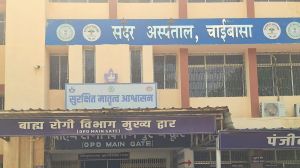Sunset industry
The Convergys call centre, off NH8, is one of many buildings in Gurgaon that lay claim to a vision of modernity through their architecture.

The Convergys call centre, off NH8, is one of many buildings in Gurgaon that lay claim to a vision of modernity through their architecture. At 1 in the morning, it is a pyramid of white light shooting up into the sky, glimpses of the people working inside visible through its transparent body. At its foot is the undergrowth of old India, a cluster of shacks that make up Convergys dhaba, where truck drivers stop by for meals and where 23-year-old Sabby Bakshi, a team leader at Convergys, has stepped out for a half-hour break.
Gurgaon8217;s high-rises tower over many such eateries that come alive at night. Across the highway, on the lane next to the GenPac office, is another row of food joints, juice stalls and teashops that keep time with their clients8217; nocturnal hours.
The nightlife here is bookended by the demands of work. Some step out to grab street food from carts selling egg rolls and chhole-kulcha. While others, like Jaspreet and Yogeesh Ghuliani, have a leisurely dinner of chicken fried rice and buttery aloo parantha on the greasy tables set out on the road, before returning to work. 8220;In the eight years 8216;ve been working for GE, I have been on the morning shift once,8221; says Ghuliani. 8220;So 8216;s food is something I have almost every day,8221; he says, pointing to the stall and its owner from Bengal.
Like Ghuliani, many have grown accustomed to a life that their parents would not have dreamed of. A country that awoke to freedom at the midnight hour was never really a creature of the night. Our parents awoke to the strains of Akashvani in the morning and slept at 10, without fuss. But between 1993 and 1994, when the first call centre was set up in India, and the initial years of the new millennium, metropolitan India8217;s body clock found a new rhythm. Every night, thousands of fresh-out-of-college youngsters turned from Raj to Roger and Uma to Amy and stayed up till dawn in air-conditioned offices to sell insurance or credit cards to Americans.
For India, they became a symbol of its confused and troubled modernity and triggered prophecies of a Western cultural invasion. Chetan Bhagat denounced the call centres as 8220;airconditioned sweatshops8221; in One NightThe Call Centre and Ashim Ahluwalia made a documentary with a dream-like feel, John and Jane. 8220;The idea of virtual 8216;call agents8217; with fake American identities who talked on the phone all night seemed straight out of science fiction8230;It is quite a bizarre job if you think about it,8221; says Ahluwalia over e-mail.
Indians are getting used to this idea of the bizarre. Today, the BPO industry, which helped India reimagine itself as a global IT player, employs seven lakh people and is worth
Rs 44,000 crore Nasscomm figures for 2007. The bigger companies no longer make their employees use aliases; the emphasis now is on 8220;neutral accents8221; and not 8220;American or British ones8221;. Ghuliani, an electronics engineer, for instance, was Ben Thomas when he started out and is now Yogi to his customers across the world.
In the metros, moreover, erratic hours no longer raise eyebrows. Bakshi, however, says that the one thing he would like to change about his job is how it is perceived. 8220;Unko lagta hai ki hum aish karne aate hai People think we are having a great time,8221; agrees Pavan Arya, Bakshi8217;s colleague from Assam. 8220;We are like any other professionals, working hard to earn money,8221; says Arya, who is 24. Bakshi goes further, claiming for his work the role of India8217;s emissary to an ignorant world. 8220;The other day I spoke to a client from London and I told him that in Delhi, too, we have Bentleys and Hummers. Man, was he surprised.8221;
Nights have also changed for
22-year-old Irfan Khan, who is part of an often overlooked narrative of the India Story. Khan is one of the lakhs of private security guards in the country entrusted with the job of guarding apartment complexes, ATMs and malls. He guards a Citibank ATM in central Delhi, works every day of the week for 12 hours and does night shifts every alternate week. He has no off-days. His home is in Bareilly and the money he sends8212;a little over
Rs 5,000 a month8212;keeps his family going. The boredom gets to him, he admits. 8220;Kya kare? Itni berozgari hai What to do? There is so much unemployment.8221;A measure of the significance of this Rs 4,000-crore industry lies in one piece of statistic8212;for the 25 lakh policemen who guard the country, there are 60 lakh security guards.
Though Khan belongs to a world different from that of Bakshi and Yogi, he, too, is a product of a new age, where the cycles of work are making old certainties appear strange. Daylight, for instance. 8220;After night shifts, you are not used to looking at the sun,8221; says Dipankar Mundu, a former call centre employee, now in Shillong. Or the city itself, which appears a different being to those who travel on its deserted streets at night.
At Convergys, meanwhile, another shift has come to an end. And Bakshi is back at the dhaba, for another chai. Some would say this schizophrenia, this shuttling between worlds of great contrasts, has always been, in a lesser or greater degree, part of the experience of living in this country. The more pertinent point8212;in this new India, you cannot turn back the body clock.
- 01
- 02
- 03
- 04
- 05































